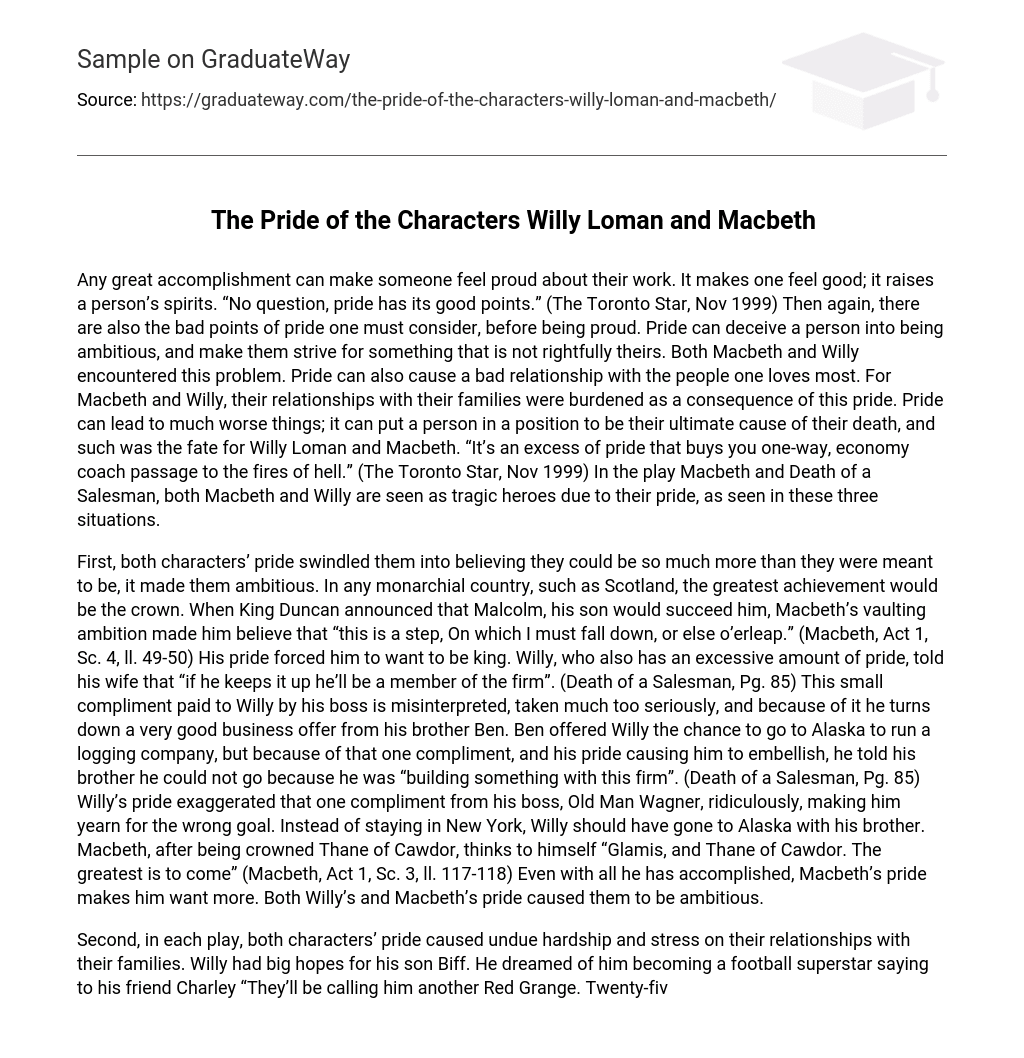The sensation of pride that arises from accomplishing something remarkable can be uplifting and enhance one’s morale. Nevertheless, it is crucial to consider the negative aspects of pride before fully embracing it. Pride has the ability to deceive an individual, tempting them to pursue aspirations that are not rightfully theirs. This was evident in the experiences of both Macbeth and Willy. Additionally, pride has the potential to strain relationships with loved ones, as demonstrated by the situations involving Macbeth and Willy’s families. Ultimately, pride can even result in tragic consequences, as observed in the fates of Willy Loman and Macbeth; their excessive pride served as the ultimate cause for their downfall. In both Macbeth and Death of a Salesman, these characters are depicted as tragic heroes precisely due to their pride, which is showcased in three significant instances.
Both Macbeth and Willy have a shared flaw – excessive pride. This pride fuels their ambition, leading them to believe they can achieve more than what their destinies dictate. In the case of Scotland, the ultimate accomplishment is acquiring the crown. When Macbeth learns that Malcolm will be his successor, his ambition takes over, as he believes he must either fail or strive for the throne. Likewise, Willy’s pride causes him to misinterpret a compliment from his boss and imagine himself as part of the firm. This false belief leads him to reject a lucrative business opportunity offered by his brother Ben in Alaska. Even after becoming Thane of Cawdor, Macbeth still desires greater greatness and firmly believes that the best is yet to come. Both Willy and Macbeth’s ambitions were driven by their pride.
In both plays, the characters’ pride had a significant impact on their family relationships. Willy Loman held high expectations for his son Biff, dreaming of him becoming a football superstar and proudly telling his friend Charley, “They’ll be calling him another Red Grange. Twenty-five thousand a year” (Death of a Salesman, Pg.89). Throughout Biff’s life, Willy placed these lofty aspirations upon him. As a result, when Biff failed to meet these dreams, he felt an overwhelming sense of failure. Eventually recognizing that both he and Willy were just ordinary individuals, Biff declared,”I’m a dime a dozen and so is Willy” (Death of a Salesman, Pg.132), which deeply angered Willy who defiantly asserted his identity as “Willy Loman” (Death of a Salesman, Pg.132). This shattered Willy’s cherished belief as Biff powerfully argued by stating,”Pop,I’m nothing! I’m nothing Pop.Can’t you understand that? There’s no spite in it anymore.I’m just what I am.That’s all” (Death of Salesman,Pg 132-133). At this point,Willy ceased to care about his grand hopes for Biff and chose not to resolve the argument.The text highlights the parallel experiences of Macbeth and Lady Macbeth, both facing family troubles as a result of their pride. Macbeth’s arrogance leads him to kill Duncan, causing his relationship with Lady Macbeth to deteriorate. Lady Macbeth expresses her belief that their happiness is uncertain, stating they are “dwelling in doubtful joy.” This realization causes them to become unable to stand each other’s company. In Macbeth, Lady Macbeth questions her husband about his solitary behavior, asking him why he keeps alone. Both plays depict the breakdown of important family connections due to arrogance, emphasizing the troubled relationship between the couple.
In the end, the deaths of both Macbeth and Willy were a result of their pride. Macbeth’s arrogance led him to believe he was invincible and he made the fatal mistake of staying to fight an entire army alone, rather than flee. He foolishly believed that our castle’s strength would easily withstand a siege. Willy, on the other hand, grappled with financial problems. His pride clouded his judgment and he preferred to maintain the false appearance of success instead of accepting job offers from his neighbor Charley. This pride ultimately drove him to take the cowardly route and end his own life, hoping that his family would benefit from his twenty thousand-dollar life insurance policy. Willy imagined that with that money, his son Biff could finally achieve something great in life. “Can you imagine that magnificence with twenty thousand dollars in his pocket?” Soon after uttering these words, Willy died in a car accident. Macbeth’s suicide was equally unnecessary, as he stubbornly fought Macduff to the death without realizing that Macduff was the only person capable of killing him. Macbeth defiantly proclaimed, “Lay on Macduff, and damned to him that first cries ‘Hold, enough!'” In both cases, their pride ultimately sealed their fates.
“The deadliest of the seven deadlies.” (The Toronto Star, Nov 1999) holds true in the cases of Macbeth and Willy, as their pride led to ambition and strained their relationships with their families. Ultimately, their pride caused their deaths. These situations portray both Willy Loman and Macbeth as tragic heroes, with pride being the root cause. “As the old saying goes, the bigger they are, the harder – and farther – they fall.” (The Toronto Star, Nov 1999)





